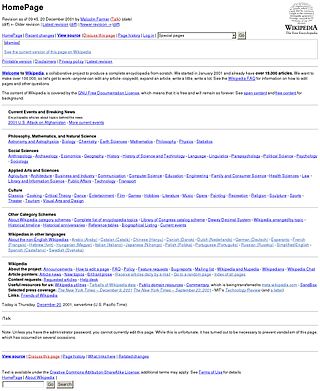
Wikipedia, a free-content online encyclopedia written and maintained by a community of volunteers known as Wikipedians, began with its first edit on 15 January 2001, two days after the domain was registered. It grew out of Nupedia, a more structured free encyclopedia, as a way to allow easier and faster drafting of articles and translations.

Wiktionary is a multilingual, web-based project to create a free content dictionary of terms in all natural languages and in a number of artificial languages. These entries may contain definitions, images for illustration, pronunciations, etymologies, inflections, usage examples, quotations, related terms, and translations of terms into other languages, among other features. It is collaboratively edited via a wiki. Its name is a portmanteau of the words wiki and dictionary. It is available in 193 languages and in Simple English. Like its sister project Wikipedia, Wiktionary is run by the Wikimedia Foundation, and is written collaboratively by volunteers, dubbed "Wiktionarians". Its wiki software, MediaWiki, allows almost anyone with access to the website to create and edit entries.

The English Wikipedia is the primary English-language edition of Wikipedia, an online encyclopedia. It was created by Jimmy Wales and Larry Sanger on 15 January 2001, as Wikipedia's first edition.

Wikibooks is a wiki-based Wikimedia project hosted by the Wikimedia Foundation for the creation of free content digital textbooks and annotated texts that anyone can edit.
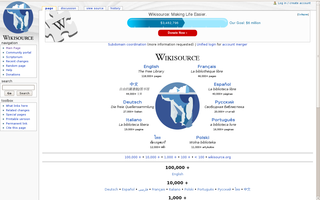
Wikisource is an online digital library of free-content textual sources on a wiki, operated by the Wikimedia Foundation. Wikisource is the name of the project as a whole and the name for each instance of that project ; multiple Wikisources make up the overall project of Wikisource. The project's aim is to host all forms of free text, in many languages, and translations. Originally conceived as an archive to store useful or important historical texts, it has expanded to become a general-content library. The project officially began on November 24, 2003, under the name Project Sourceberg, a play on Project Gutenberg. The name Wikisource was adopted later that year and it received its own domain name.

The German Wikipedia is the German-language edition of Wikipedia, a free and publicly editable online encyclopedia.

The Polish Wikipedia is the Polish-language edition of Wikipedia, a free online encyclopedia. Founded on September 26, 2001, it now has more than 1,616,000 articles, making it the 11th-largest Wikipedia edition overall. It is also the second-largest edition in a Slavic language, after the Russian Wikipedia.

The Wikimedia movement is the global community of contributors to the Wikimedia projects, including Wikipedia. This community directly builds and administers these projects with the commitment of achieving this using open standards and software.

The International Committee on Taxonomy of Viruses (ICTV) authorizes and organizes the taxonomic classification of and the nomenclature for viruses. The ICTV develops a universal taxonomic scheme for viruses, and thus has the means to appropriately describe, name, and classify every virus taxon. The members of the International Committee on Taxonomy of Viruses are considered expert virologists. The ICTV was formed from and is governed by the Virology Division of the International Union of Microbiological Societies. Detailed work, such as identifying new taxa and delimiting the boundaries of species, genera, families, etc. typically is performed by study groups of experts in the families.
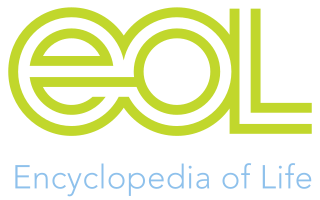
The Encyclopedia of Life (EOL) is a free, online encyclopedia intended to document all of the 1.9 million living species known to science. It aggregates content to form "page"s for every known species. Content is compiled from existing trusted databases which are curated by experts and it calls on the assistance of non-experts throughout the world. It includes video, sound, images, graphics, information on characteristics, as well as text. In addition, the Encyclopedia incorporates species-related content from the Biodiversity Heritage Library, which digitizes millions of pages of printed literature from the world's major natural history libraries. The BHL digital content is indexed with the names of organisms using taxonomic indexing software developed by the Global Names project. The EOL project was initially backed by a US$50 million funding commitment, led by the MacArthur Foundation and the Sloan Foundation, who provided US$20 million and US$5 million, respectively. The additional US$25 million came from five cornerstone institutions—the Field Museum, Harvard University, the Marine Biological Laboratory, the Missouri Botanical Garden, and the Smithsonian Institution. The project was initially led by Jim Edwards and the development team by David Patterson. Today, participating institutions and individual donors continue to support EOL through financial contributions.

The history of wikis began in 1994, when Ward Cunningham gave the name "WikiWikiWeb" to the knowledge base, which ran on his company's website at c2.com, and the wiki software that powered it. The wiki went public in March 1995, the date used in anniversary celebrations of the wiki's origins. c2.com is thus the first true wiki, or a website with pages and links that can be easily edited via the browser, with a reliable version history for each page. He chose "WikiWikiWeb" as the name based on his memories of the "Wiki Wiki Shuttle" at Honolulu International Airport, and because "wiki" is the Hawaiian word for "quick".

The Wikimedia Foundation, Inc., abbreviated WMF, is an American 501(c)(3) nonprofit organization headquartered in San Francisco, California, and registered there as a charitable foundation. It is the host of Wikipedia, the seventh most visited website in the world. In addition, the foundation hosts 14 other related content projects. It supports the development of MediaWiki, the wiki software that underpins them all.

The Swedish Wikipedia is the Swedish-language edition of Wikipedia and was started on the 23 of May 2001. It is currently the fifth largest Wikipedia by article count with its 2,585,280 current articles, it has a Wikipedia article depth of 17.51. A majority were generated by Lsjbot, a bot, or software application. The administrators on the Swedish Wikipedia are elected for a fixed-term period of one year and have to be re-elected after that time.
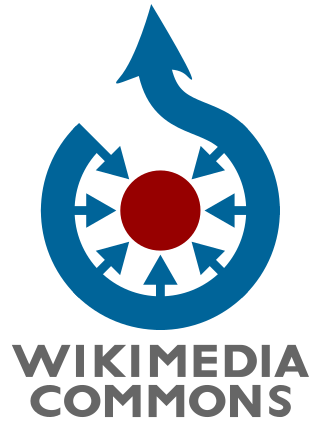
Wikimedia Commons, or simply Commons, is a wiki-based media repository of free-to-use images, sounds, videos and other media. It is a project of the Wikimedia Foundation.
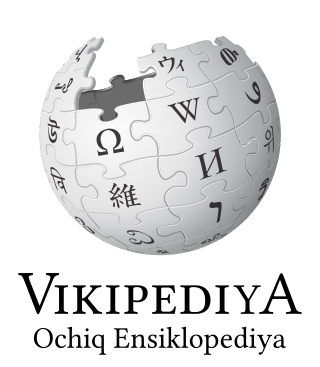
The Uzbek Wikipedia is the Uzbek-language edition of the free online encyclopedia Wikipedia. It was founded in December 2003. Articles in the Uzbek-language edition are written in the Latin script. In August 2012, a Latin-to-Cyrillic converter was added to allow users to view Uzbek Wikipedia's pages in both the Latin and Cyrillic scripts.
AnimalBase is a project brought to life in 2004 and is maintained by the University of Göttingen, Germany. The goal of the AnimalBase project is to digitize early zoological literature, provide copyright-free open access to zoological works, and provide manually verified lists of names of zoological genera and species as a free resource for the public. AnimalBase contributed to opening up the classical taxonomic literature, which is considered as useful because access to early literature can be difficult for researchers who need the old sources for their taxonomic research.

The Wikipedia community, collectively and individually known as Wikipedians, is an online community of volunteers who create and maintain Wikipedia, an online encyclopedia. Since August 2012, the word "Wikipedian" has been an Oxford Dictionary entry.
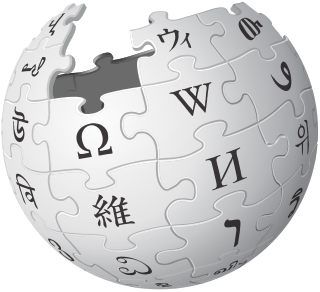
The following outline is provided as an overview of and a topical guide to Wikipedia:
A WikiProject, or Wikiproject, is an affinity group for contributors with shared goals within the Wikimedia movement. WikiProjects are prevalent within the largest wiki, Wikipedia, and exist to varying degrees within sibling projects such as Wiktionary, Wikiquote, Wikidata, and Wikisource. They also exist in different languages, and translation of articles is a form of their collaboration.


















